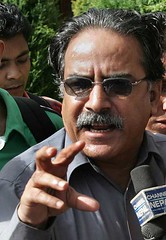
Prachanda, the leader of the Communist Party of Nepal (UML), has been sworn in a Prime Minister of this South Asian nation. The country has gone from a monarchy to a republic in a short period of time.
Originally uploaded by Pan-African News Wire File Photos
"I will remain faithful to the nation and my countrymen"
Prachanda at his swearing-in
The Nepalese Maoist leader, Prachanda, has been sworn in as prime minister, completing his transition from rebel leader to constitutional politician.
Prachanda, the chairman of the Communist Party of Nepal, took the oath of office following his election last week in the constituent assembly.
He said he would remain faithful to nation and to the people of Nepal.
Maoists won a surprise victory in April elections, and two other key parties supported his bid to be premier.
Prachanda took the oath of office from President Ram Baran Yadav on Monday in an event that was broadcast live on national television.
His Maoist party won 227 seats in the 601-member constituent assembly in April elections to become its biggest group.
That body, which also works as a parliament, overwhelmingly voted to abolish the 239-year-old monarchy a month later and is now expected to draft a constitution.
"We have come from a different background and this is a mandate the people have given to us to lead the country to peace," Prachanda after his party's surprise victory in the vote. "We'll honour this."
The 53-year-old won 80% of votes in the assembly on Friday to defeat his only rival, the Congress Party candidate, Sher Bahadur Deuba.
It is only two years since Prachanda emerged from more than two decades underground as a militant communist leader.
What the Maoists called their "people's war" left 13,000 people dead, tens of thousands displaced and much of the country's infrastructure destroyed.
Correspondents say that the former guerrilla will now be the most powerful politician in the Himalayan country.
Monday's swearing in ends months of political deadlock that had followed the sacking of the unpopular King Gyanendra and the abolition of the 240-year-old monarchy.
Prachanda's elevation had long seemed inevitable after his party scored its convincing win in April.
He was almost guaranteed victory because he had the support of three parties - his own, the Communist Party of Nepal (United Marxist-Leninist) and the MJF (Madheshi Janadhikar Forum).
The opposition Congress party has accused the Maoists of plotting to set up a totalitarian communist regime, a suggestion they have strongly denied.
Story from BBC NEWS:
http://news.bbc.co.uk/go/pr/fr/-/2/hi/south_asia/7568039.stm
Published: 2008/08/18 12:10:46 GMT
No comments:
Post a Comment